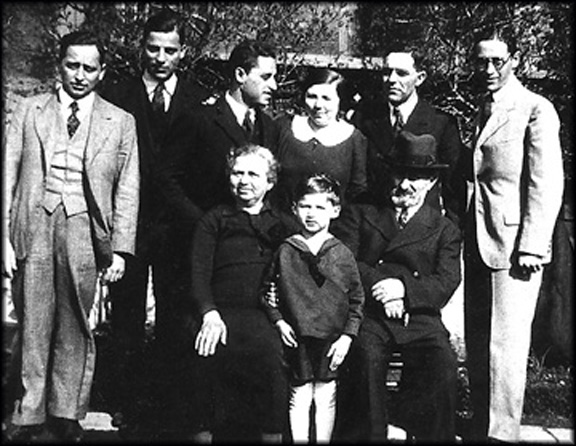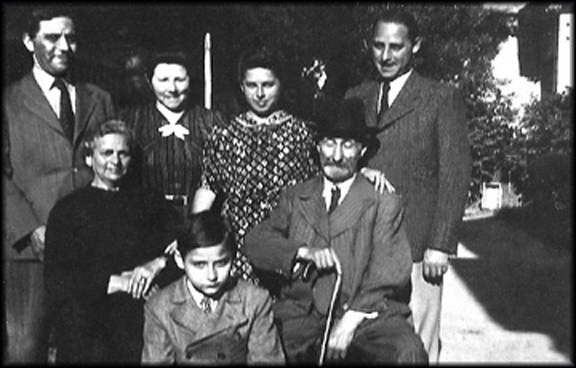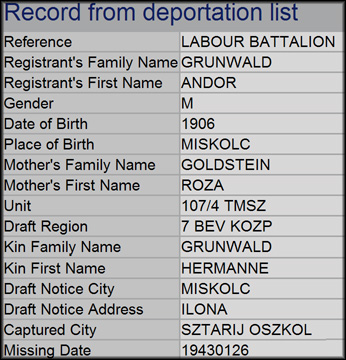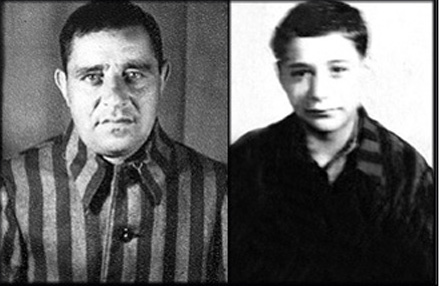




Front: Roza, Henrik, and Herman Grunwald.
Back: Andor, Jozsef, Imre, Franciska, Ede, and Marton Grunwald.
(Miskolc, ca. 1936)
Herman (Armin/Hirsch Leib) Grunwald was born in Maramarossziget. Hungary in 1869. He married Roza Goldstein and their oldest son Ede was born in Maramarossziget on July 13, 1899. By the beginning of the twentieth century, the Grunwalds were living in Miskolc, where they had four more sons: Marton (born 1904), Andor (born 1906), Izsak (Imre) (born 1907), and Jozsef (born 1909). Herman also had a son Jeno, a half-brother to his children with Roza, who emigrated to the US after World War I.
Ede studied in Miskolc and was graduated from the Catholic Gymnasium in 1917. After World War I, he married Franciska Blum, who was born in 1898 in Sopron (Burgenland district). Ede and his family lived in Budapest, where their son Henrik was born in March, 1931. Herman and Roza's four other sons were educated in Miskolc and, after studying for various professions, eventually made their living by repairing watches. Imre had a shop at Szechenyi utca 80 in Miskolc. [The Sugar family lived above the watch shop. Their descendant, Miskolc researcher Andras Hirschler, provided this website with a photo of the building.] Andor also had a watch shop, about a half-mile down the street. Jozsef had a watch repair shop on Csaky utca in Budapest. Marton was a clerk in a small town but, after he lost his job in 1940 because he was Jewish, he returned to Miskolc and worked in the shop owned by his brothers. Izsak married married Klari Varady, whose family also owned a watch repair shop on Szechenyi utca, opposite the theater. Imre and Klari had a daughter Marika, who was born in Miskolc in 1940.

Front: Roza Goldstein, Henrik Grunwald, Herman Grunwald
Back: Ede, Franciska, Klari, and Imre Grunwald (Miskolc, ca. 1941)
Herman, the Grunwald family patriarch, died in Miskolc on February 25, 1942 and was buried in the Jewish cemetery on Avas Hill. According to records in Yad Vashem, Marton, Andor, Imre, and Jozsef were conscripted into forced labor battalions in 1942. For a few weeks after their sons were deported, the Grunwalds received some letters from them. Unfortunately, the cruel fate of Jews in the Hungarian labor battalions is well known. Without clothing to protect them from the harsh Russian winter and subject to the virulent anti-Semitism of the Hungarian soldiers who commanded them, the ill-fated Jews had little chance to survive. The four younger Grunwald brothers perished during the Russian offensive in the Don curve in January, 1943. Imre’s wife Klari and daughter Marika are believed to have survived the war; however, their relatives never learned where they were.

Translation of deportation-list entry for Andor Grunwald.
Source: Beate Klarsfeld Foundation. For the Foundation's searchable database on
the fate of more than 350,000 Jews in Hungary during the Holocaust, click here
By the end of January, 1943, Roza Grunwald’s husband and four of her sons had died and she was living alone in her flat on Ilona utca in Miskolc. In the summer of 1943, Ede’s wife Franciska and their son Henrik came from Budapest to Miskolc to live with Roza. Henrik previously had visited his grandparents each summer, so was familiar with Miskolc. In 1943, he began his studies there. On March 19, 1944, Henrik was to have become a bar mitzvah. On the day before, the Germans had occupied Hungary. Henrik’s father Ede had intended to travel by train from Budapest to Miskolc, in order to attend his son’s bar mitzvah; but he was forced to return to Budapest because the Germans were arresting Jews on the trains. Eventually, Ede was able to join his family in Miskolc.
The lives of Jews in Miskolc deteriorated quickly after that. They were required to wear the yellow Star of David. Jewish schools were closed. The city’s Jewish residents were ghettoized and, soon thereafter, they were herded into a brick factory near Miskolc. "Within one hour,” Henrik recalled, "we Jews of Miskolc lost our civil rights, our wealth, our homes, and our dignity.” In June, 1944, Ede, Franciska, Henrik, and Roza were deported from Miskolc to Auschwitz-Birkenau. When they arrived at the notorious concentration camp, the men were separated from the women. Franciska took Roza’s arm after the selection was made and they marched together to their deaths in the gas chambers. Henrik stayed with his father Ede. When the infamous Dr. Mengele asked Ede how old Henrik was (he was only 13), Ede added three years to his son’s age and said that he was 16. Fortunately, Henrik was tall for his age, so Mengele believed the life-saving fiction and let the child go with his father.
Ede and Henrik were transported to Allach, a subcamp of Dachau, where they were separated. Alone and frightened, 13-year-old Henrik was sent to the Muhldorf work camp. At first, he was with some people from Miskolc; but they eventually perished and Henrik was left to survive on his own. Half dead from disease and starvation, Henrik was liberated by the American army on May 2, 1945. He and his father met in Germany and returned together to Budapest. In 1949, Henrik made aliyah to Israel. He changed his name to Mordechai Gidron and married Esther. The Gidrons had two children and four grandchildren. Ede Grunwald and his second wife joined them in Israel in 1957. Ede (then known as Edward) died in Tel Aviv on May 11, 1970.

Ede (left) and Henrik Grunwald at
the time of their liberation in 1945.
In his autobiography, Mordechai Henrik Gidron wrote: "In 1985, the Hungarians allowed Israeli citizens to visit Hungary. My first task in Hungary was to see Miskolc, where my father’s family had lived in 1944. With the exception of my grandfather’s grave, I found nothing there. I visited the grave on Avas Hill and the big synagogue on Kazinczy utca. I crossed the main street [Szechenyi utca] and recognized the location of my uncles' stores and found the place where my grandparents had lived. After a short while, I’d had enough of this 'nothing' that I found in Miskolc. I took the first train and left that cursed place behind me as soon as possible."
Click here to read Mordechai Henrik Gidron's detailed autobiography: Szalloda gyermekkor (in Hungarian), Trotzdem Weiter Delebt (in German). Malon Yaldut (in Hebrew). Unfortunately, the memoir has not yet been translated into English.
Credits: Page designed and text copyright © 2011 by Helene Kenvin,. Photographs copyright © 2011 by Mordechai Gidron. Page created by Helene Kenvin. All rights reserved.